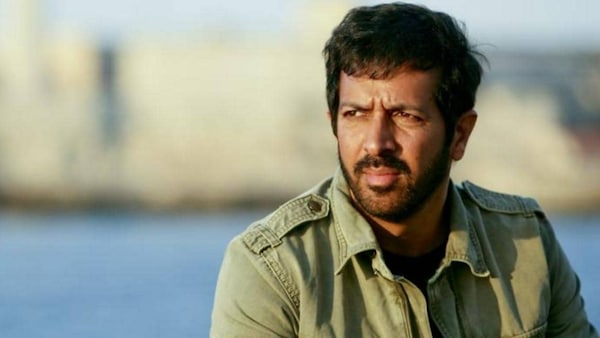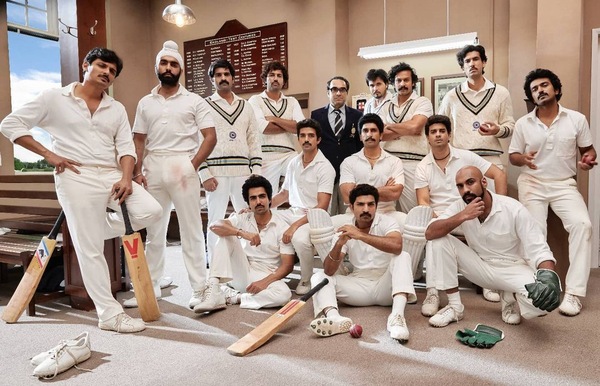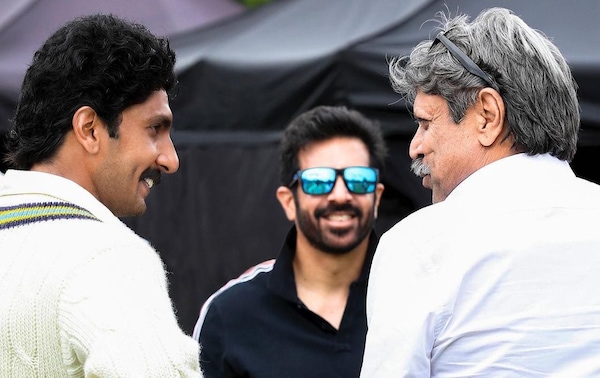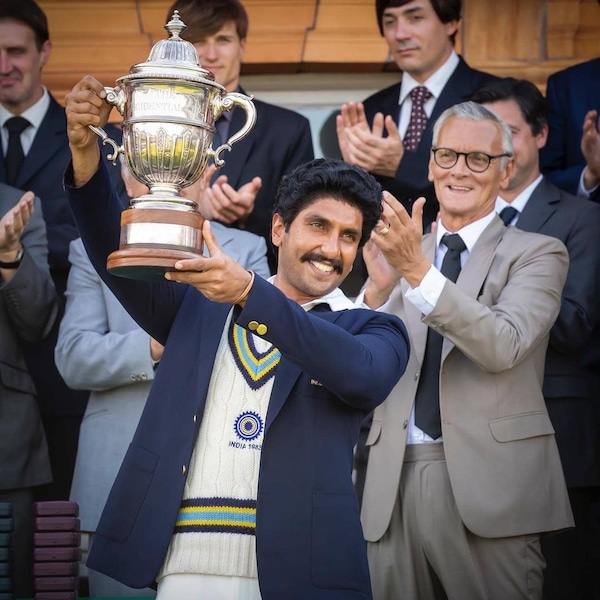Exclusive! 83 director Kabir Khan: I celebrate patriotism in my films, but I'll never make them jingoistic
Kabir Khan also narrated the whole of Kapil Dev's innings against Zimbabwe, enacted by Ranveer Singh in the film, as there's no footage of this anywhere in the world.

Last Updated: 06.22 PM, Dec 30, 2021
After a long wait, Kabir Khan finally got his magnum opus, based on India’s first World Cup win, to the big screen. Ranveer Singh plays the determined captain, Kapil Dev, along with an ensemble of talented actors who make up his team on screen.
Nearly a week after the release of 83, Khan is riding high on the film’s success as both the masses and critics have given it a lot of love. However, due to the new Omicron variant striking the country, cities and theatres are retreating to a state of shutdown and curfews.
In an exclusive chat with OTTPlay, the filmmaker spoke about the pandemic marring the scope of his film’s performance by repeating what Kapil Dev told him: “When we won the World Cup, we didn't get money, we got respect, and it's because of that respect that today, you're making a film 38 years later about us. This is the same respect that you're getting from making this film. So don't even worry about what happens, which theatres are shut down, where the night curfew is. Just enjoy the love and the respect that you're getting for the film, because ultimately, that's what makes the film live in the memory of people."
Khan also narrated the whole of Dev's innings against Zimbabwe as shown in the film, as there's no footage of this anywhere in the world. Additionally, he shared his thoughts on the process of casting such a large cast, how he doesn’t make jingoistic films, and more.
Excerpts from the conversation below:
How did you recreate Kapil Dev’s innings against Zimbabwe when there's no footage available anywhere?
It was one of the toughest parts of the film to crack also, because it's very clear that it was the most anticipated thing nobody had ever seen in Tunbridge Wells. For the first time, people are going to watch Tunbridge Wells in our film. So it was also a huge responsibility for us to be able to live up to an innings that was almost mythical in its proportions in the legends of cricket. Yes, there is no footage available for reference. I went to the Tunbridge Wells naval ground and I spoke to the people over there. I went to the clubhouse there. It's in Kent County, a beautiful little town, and I asked if I could speak to people who had seen that. A lot of gentlemen came, and I spoke to them. They started telling me sort of a blow-by-blow account of what happened that day. The gentleman whose windshield Kapil Dev cracked was still complaining and saying that he broke my windshield and how he had to run to get his car out and then he was followed by people; suddenly, there was a stampede in the car park. So I just find this kind of imagery so fantastic. When people are seeing and reacting the way they are at Tunbridge Wells, I went to some of the theatres and saw people screaming and shouting and sort of waving the flag as Tunbridge Wells unfolded on screen. I think it's all been worth it.
What did the World Cup win, as well as making a movie about that victory, mean to you? The research would have unearthed a lot of lessons that would have made the fan in you fall in love with the event even more.
As I said, once we took on the challenge of recreating one of the most iconic events in our sporting history, there came a lot of responsibility with it. Also, how to be absolutely authentic about it. I think this is where my documentary background came to my assistance because I knew through my documents how to set up the structures for research and how to sort of approach it in a certain disciplined manner. So it was two years of very hard research that went into this film, recreating the event. I'm really happy that attention to detail and that sort of level of research is something that the audience, those who have watched the film, are celebrating and appreciating. The kind of feedback we're getting about people noticing little details, even down to the way they used to tie their laces then, I think that's rewarding, and I'm so happy that every department of our work is paying off.
The use of real photographs and footage in between the film had a good impact on how the story was told. So was it always on your mind to use these to further the story?
Right from the beginning, that was something that I had in mind. Of course, when I was editing with my editor, Nitin Baid, it became more about looking at more possibilities and saying, "Okay, we can do it here, we can do it there." So I think it grew. Initially, of course, it was there on paper and in the script, but I think Nitin has taken it to the next level because of the seamlessness with which he has edited it. See, I've often actually seen some films and shows that have done it, and what happens is that the moment that comes, the credibility of that story suddenly hits you. It suddenly hits you, "Oh, my God, this is such a fabulous story, but it's also true; this is exactly the way it happened." When that realization hits you, that's when the gooseflesh moments happen. That's when we realize, "Oh God, you're watching a film which is way more than just another film."
The movie had a lot of brilliant touches, like Mohinder Amarnath playing his dad, Malcolm Marshall's son playing him, Sachin Tendulkar being inspired, etc. Did these happen organically or were they gimmicks to remind the next-gen of the impact the World Cup win had?
Nothing happens by chance in a film; everything is by design, and there's a lot of effort and thought that goes into it. So when we were sort of planning it, we did think about it. Yes, the fact that Malcolm Marshall's son will end up playing his father is something that we couldn't have planned for, we could only hope for. And then it happened that Mali Marshall came on, and he looks exactly like his father, bowls like his father, and we could get him to be a part of the film. Clive Lloyd's son Jason is also part of the film; he's playing Joel Garner. It's only in the research that we discovered that Clive Lloyd's son is a six-foot-eight-inch bowler, which is what Joel Garner was. Gordon Greenidge's son, Carl, is playing his father. So in these kinds of instances, something that you can plan for, these are the things that do happen and create magic. But I'm so happy that you see that kind of film where everything has fallen into place. It's getting the kind of love that the audiences that are seeing the film are showering upon us.
Were you concerned whether the film's version of how the events transpired would now replace the truth about how everything played out for the next generation?
The fact that we've not strayed away from the truth and are as close to the truth as possible is something that doesn't bother me. Sometimes I tell the boys, because they are appreciated so much for representing all these iconic players, "For a large part of the audience, you are now the face of the 1983 team. They will remember you as the 1983 team. " In that sense, I'm not worried about it. If this film becomes a sort of part of popular culture, then whenever they think of 83, they'll start thinking and remembering the visuals of this film as what happened in 83. I think it's a great compliment to us as filmmakers and as a team that put it over there. The fact that we stayed close to the truth is something that can alter what happened then, but it never came to us.
Where do you draw that fine line, catering to the emotions of the fans, the love for a sport, which also translates into love for the country, but does not go overboard so that it becomes jingoistic?
So jingoism is something that I, inherently, would never be able to get into because that's just not my DNA, that's just not my ideology. I celebrate patriotism, but I'll never make it jingoistic. That's something that the audiences have also said in the 1000s of comments that we're getting on this, how they appreciated the fact that the film is patriotic. It makes you feel proud to be an Indian, but never makes you feel jingoistic. Jingoism is like patriotism, but it's at the cost of somebody. It's like if you have an enemy, or if you have to, route it through that, that doesn't happen. Here, you're just proud to be an Indian, seeing the achievements of this team, and that's what true patriotism is, right? You're celebrating your country without necessarily having a counterpoint or a villain or enemy in the context.
Do you think casting the right actors was like half the battle won?
The casting was a very big battle for sure. If the casting had not come right, if the boys had not fallen into place, representing all the players that they were, the film would not be what it is. The film would not work in such a huge way as the way it is working right now for the audience. So in that sense, yes, it was a big one, and that's why it took a year and a half from the first casting to the last casting. It took us time to find people who not only looked similar to the players, but it's not looking similar in terms of exactly the features, because I've often told them it's not a lookalike contest, you just have to get the person's personality right. So that worked for us, and I think that's what's making the film what it is today.

83 took a long time to be made. It was supposed to be released in 2020 but was delayed due to the pandemic. Now once again, after the release within a week, theatres are shutting down. So what's your current state of mind?
You're right, we have waited for this film for close to two years. We were keen on coming out at a time when maybe the pandemic is on the wane and we'll get the correct time to be able to showcase it in all the theatres. But I think this is the world we're living in. The whole world is being affected by the pandemic so badly that nobody can predict what's going to happen. Unfortunately, the day we released it, on that day itself, the Omicron wave took off. Two states have announced a night curfew. By the second day, another three or four had been added. On the fourth day of release in Delhi, all the theatres shut down, and that's a large part of our box office. But I guess these are things out of our control. It's such a large event that has overtaken the entire planet that I would feel petty now, sitting here complaining about that. I can only look at the positives. I can only look at the fact that the film has gotten unprecedented appreciation and love. It's unbelievable the kind of love that's constantly pouring in for the film. It's a film that's definitely now been established that will have a very long life. I'm hoping people are still going to go wherever the theatres are open. They're going to take those precautions, and we're still going to go. Because watching this film on the big screen is a completely different experience. It's an experience that can never be replicated. So I'm sure that people, wherever it is open and available, will continue to go.
Yes, of course, we are in a bit of an uphill struggle against the pandemic, and with every day, more restrictions are coming in and rules are coming in that hit the box office more and more. But it's fine, the film is for posterity. It will be enjoyed for years to come. When I was feeling a little low about all this, Kapil Sir said a very beautiful thing, and I've taken that to heart, therefore not feeling bad. He said, "When we won the World Cup, we didn't get money, we got respect, and it's because of that respect that today, you're making a film 38 years later about us. This is the same respect that you're getting from making this film. So don't even worry about what happens, which theatres are shut down, where is the night curfew. Just enjoy the love and the respect that you're getting for the film, because ultimately, that's what makes the film live in the memory of people.”

How would you describe the vibe on the sets during the climax shoot, as even Clive Lloyd was present during the filming?
It was magical. Clive Lloyd came on to our set, and I've often said that this is a film that's been sort of blessed by the gods of cricket. These legends used to just randomly stroll around on our set when we were shooting. So it happened on the day that we were shooting, and anyway, it was a bit of a magical moment for us when we were shooting in Lords on the very particular spot where Kapil Dev lifted the World Cup. We were standing there and we recreated everything because there was video footage. So we paid great attention to detail to recreate everything, and it was exactly the way it was in 1983. Then, before I could roll, suddenly Clive Lloyd strolls in and sits next to me. I was looking at him like I was shocked, and I said, "Sir, do you want to sit closer to where the shot is being taken?" He looked at me with a straight face and said, "Do you want me to see the World Cup being taken away for the second time?" And then he smiled. After that, something even more incredible happened. As I was about to take the shot of the World Cup being given to Kapil Dev, these two ladies with white gloves brought a trolley covered with a velvet cloth. They removed the velvet cloth and the real World Cup, which they had just taken from the museum, and they brought it in and handed it over to me and said, "We would like you to shoot with the original." I got gooseflesh and I held it. I went straight to Ranveer. I gave it to him and I called for action. The scene was acted out, and the moment I said "cut," everybody on that balcony started crying. It was so overwhelming that they just put the cup down, and everyone broke down. So, I think that was a very special moment.
I want to know about your approach to toning it down so that even non-cricket fans could enjoy it. Do you believe it has worked based on the feedback from the movie?
I think, hugely, the strongest reactions that I've gotten are from people who don't watch cricket. Women who have not watched cricket, they've been so emotionally moved by this film. So, in that sense, that was always going to be an uphill task for us. I'm really happy that that's the reaction I've got from people who don't watch cricket. They said, "It's not about the sport, it's just that you're so drawn into the story of the team, of the people, it's just that emotionally they draw you in." It's not about what they're playing; they could be playing Kabaddi for all they care. But as long as the human story is what draws them in. So that's been very nice to hear from people.

You have made documentaries, movies, and web series. As a filmmaker, how do you find these mediums different?
They're different, yet they're similar because, ultimately, it's about telling a story, right? I believe every story, in a certain sense, dictates its treatment. Certain stories need a longer format. You need to develop characters over a longer time frame. If the story is like that, then it's probably best said on an OTT platform. There are some stories where I think they're better suited to a shorter format, like a film. Too much is discussed and said about this whole difference between OTT and theatrical, and I think, as a filmmaker, I'm just really happy that we have multiple formats to be able to tell stories in, and that's what we ultimately need. The same goes for documentaries. Some stories are best told in a documentary format. If ever that kind of story were to come to me, I would do that.
So what's next for you—an OTT space or a film?
I'm discussing ideas. There are some ideas for the OTT and some that are for theatrical release. So ultimately, it depends on when things fall into place, which one I feel is better executed earlier. So I'm open to both. Absolutely. I'm open to the web space and theatre. So it all depends on the story and it all depends on the timing. At any given moment in time, we are always talking about two or three projects. It all depends on when it all finally comes together.
So are you making a Kandahar hijacking series?
That is definitely one of the projects that I'm talking to Netflix about. There's no sort of official confirmation as yet. I think that will happen if things fall into place. The moment that happens, we will announce it and maybe start working on that. But it is one of the projects that we will be discussing.
Another one that has become a topic of discussion is the Bajrangi Bhaijaan sequel, which Salman Khan confirmed...
KV Vijayendra Prasad is writing the script right now. See, a project is only confirmed once everything falls into place and the script is locked. As a director, I sit with the actor, and we sort of get equally excited and then say, "Let's do it." Till then, we are having multiple conversations because, at the end of the day, all of us are in a creative field. Whenever we meet, we talk about ideas, stories, and scripts, all of them don't always materialize. Every film has its destiny. As and when things fall into place, I'll be announcing what I'm doing.
Subscribe to our newsletter for top content, delivered fast.

